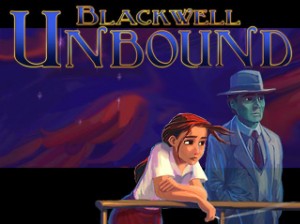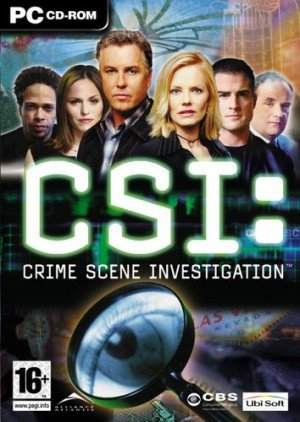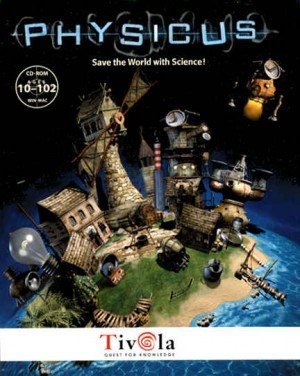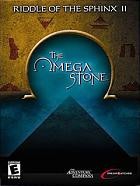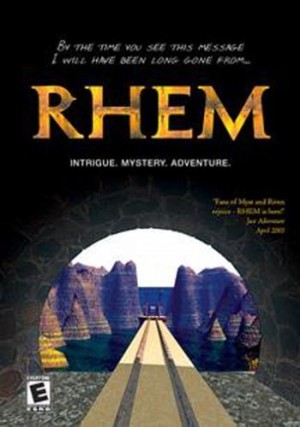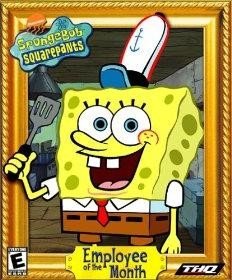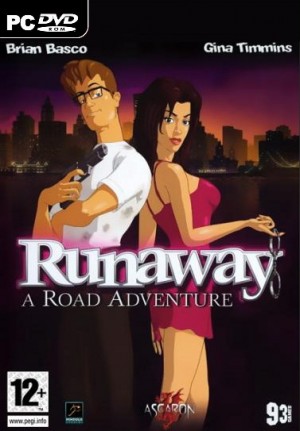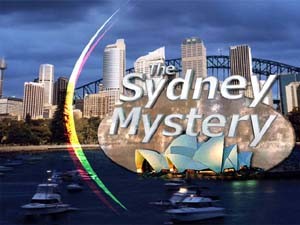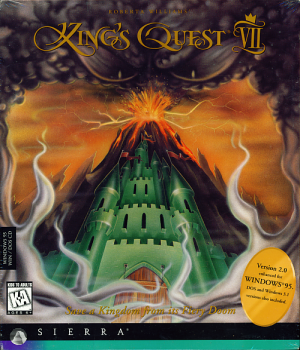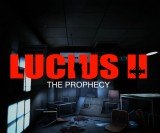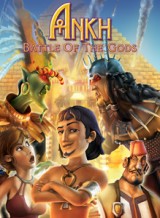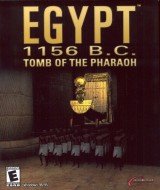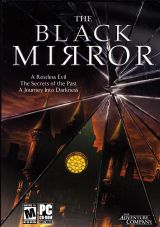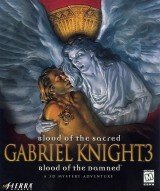Review for Blackwell Unbound
In film terms, a cheapquel is a low-budget follow-up to a successful movie, usually released direct to video to cash in on the goodwill created by the original. Of course, sometimes the result is enjoyable in its own right—Toy Story 2 started out as a cheapquel project. With a well-told story and engaging gameplay, Blackwell Unbound falls toward the respectable end of the adventure game cheapquel spectrum, even though the corners cut during production make their absence felt and turn the overall experience into something less than it should have been.
Blackwell Unbound is the third game in little over a year from Wadjet Eye Games, Dave Gilbert’s one-man development studio. In The Blackwell Legacy, young New York City writer Rosa Blackwell inherited a ghost called Joey Mallone, who for generations had acted as a "spirit guide" for the women in her family. Together they took up the task of bringing unhappy ghosts to their final rest. Blackwell Unbound jumps some thirty years back in time, introducing Joey’s previous partner (and Rosa's aunt), Lauren Blackwell. On one summer night in 1973, Lauren and Joey must solve two separate cases, and then uncover the sinister connection between the ghosts' stories.
The break in chronological order is due to the game's origin; namely as a couple of flashback sequences that were cut from The Blackwell Convergence, the forthcoming Blackwell sequel, for reasons of length. Gilbert, in an effort to "use every part of the buffalo," took the leftovers and turned them into a game in their own right. The result is a shorter Blackwell installment, a little something to keep fans busy while they are waiting for the next full episode in the series.
Where Legacy spent a great deal of time on background exposition, Unbound adopts a much snappier pace, throwing players right into the action. As the game starts, Lauren and Joey have already checked out a number of leads, and only have a couple of things left to cross off their list before they call it a night. Inevitably, those stray leads quickly bloom into full-blown investigations. Blackwell veterans will no doubt hit the ground running, but newcomers to the series may not have the background knowledge to fully appreciate everything that goes on. So if you don't know what the deal with Joey's magic necktie is, you should probably seek out The Blackwell Legacy first. The game nevertheless comes with a tutorial feature to get novice gamers up to speed on the pointing and clicking.
Less exposition means that the balance of puzzles to conversation has also shifted, making this game a more active experience. I completed Blackwell Unbound in 2 ½ hours, an hour less than the first game took me, but that's not because there is significantly less to do. There is almost the same amount of actual game here; the shorter play time is mostly due to having fewer and shorter non-interactive conversation scenes. The effect is a more compact, and in some ways more enjoyable, game.
The gameplay by and large eschews typical inventory puzzles, instead emphasizing conversation challenges and the gathering of clues. In a neat twist, players can freely switch between controlling Lauren and Joey, and must figure out how to combine their unique abilities to solve the situation at hand. This adds a whole new dimension to the puzzles, and turns Joey into a more integrated part of the game.
Unfortunately, the notebook system that worked so well in the first game is completely undermined here. Instead of serving as a concrete artifact for reasoning about your investigations, the notebook is reduced to little more than a list of dialog topics. There are only two occasions in the whole game where you have to combine clues in the notebook, and one of those is painfully contrived. Worse, there are many important clues that simply aren't entered into the notebook, and which you have to remember on your own. This makes otherwise reasonable puzzles seem astonishingly unfair, and forced me to keep my own notes outside of the game, which rather defeats the purpose of an in-game notebook.
Once you catch on that you can't trust your notebook, the puzzles aren't particularly difficult, and if you get stuck on one case, you can work on the other one for a while. The two investigations proceed independently and in parallel, and can therefore be solved in any order. This bit of non-linearity gives a satisfying feeling of freedom.
The plot is fairly standard ghost story stuff for the most part. Dave Gilbert, as writer and designer, keeps things moving briskly and wisely chooses not to dwell on familiar details longer than necessary, so it is all quite entertaining. One of the cases, involving a riverside promenade haunted by the sound of someone playing saxophone, even achieves a surprising degree of poignancy. Similarly, a set of dream journals strikes exactly the right balance between hinting at future developments and remaining strange and mysterious. There are some fine examples of adventure game writing here, and they clearly show the potential this series has.
Only at the end, when the game tries to tie everything together, does it fall to pieces somewhat. The conclusion is clearly part of Gilbert's overarching plan for the Blackwell series, but it feels awkwardly shoehorned into this game, and is not particularly gripping in its own right. Consequently, the grand climax chokes on lengthy exposition and unconvincing twists. It all hinges on one character doing something that doesn't make any sense, either rationally or based on the character development up to that point. It is an uncomfortable and unsatisfying ending to an otherwise agreeable story.
While there's a strong focus on the plot, the setting feels underdeveloped. Many stories that are set in the past overdo the period references and the retro design. Blackwell Unbound underdoes them. Although the game takes place in 1973, at the very height of the Watergate scandal, no reference to this, or to any other events of the time, is made. The fashion, hair styles and décor may be intended to establish the era, but with the low-resolution, cartoony graphics, they don't come across as particularly old-fashioned. The game could just as easily be set in 1993, or, with minimal modifications, in 2003. The effect is not to make the action timeless, but rather to unmoor it from its environment, as if it took place in a bubble rather than the "real" world.
This lack of a sense of history extends to the characterization. In particular, Joey scarcely seems different from his thirty-year older self. Alright, so as a ghost he obviously doesn't age, but one would still think that post-mortem existence would leave some mark on his personality. As it turns out, his interactions with Lauren Blackwell are exactly the same sitcom bickering his relationship with Rosa consisted (or will consist) of. There are minor differences in their dynamic, but they are subtle indeed, to the point that this could easily have been another Rosa and Joey adventure.
On an individual level, Joey Mallone is nevertheless the character that comes off best, admirably holding up the spooky end of the ghostbusting duo. Though his personality remains unchanged, his Prohibition-era wise guy affectation has been toned down since the first game, and his more active role in this outing gives him a chance to demonstrate a greater range of emotions. Returning as the voice of Joey, Abe Goldfarb (who also played Rabbi Stone in The Shivah) shows himself eminently up to the task.
Lauren Blackwell is revealed as a tougher cookie than her niece will grow up to be. She is more confident, more aggressive, and far less awkward. Other than that, her character remains curiously blank. Throughout the game she suffers from generic ennui, but when the end credits roll we are no closer to understanding her blues than we were at the opening titles. Sometimes it seems as if chain smoking is meant to substitute for real character development. Dani Marco, an actor with a number of film and TV credits to her name, does the most with the part, and radiates charisma whenever she gets to act anything other than fed up.
When it comes to the secondary characters, the performances are far more variable. A number of the actors are very good, but a few are distractingly bad. In particular, the old women are all played as cackling caricatures, and don't sound remotely convincing. The recording quality is adequate, except that on Lauren's lines you can frequently hear the actor blowing into her microphone.
By far the most impressive aspect of the audio is the soundtrack. Thomas Regin provides a melancholy jazz score that is a pleasure to listen to on its own, and never intrudes on the other aspects of the game. The background tracks complement their respective scenes seamlessly, and the game happily provides several opportunities for musical numbers to take center stage. A lack of memorable hooks arguably stops it from ascending to true classic status—barely; but this is unquestionably a first rate soundtrack.
On the visual side, Blackwell Unbound retains the low-resolution, VGA-like style of its predecessor. This time around, most of the in-game art is provided by Erin Robinson, whom some may know for her Underground game Spooks. She gives Unbound a simpler, less sophisticated look that is not without a certain naïve charm, but that underwhelms following the sleek pixel art of The Blackwell Legacy. Many of the exterior backgrounds feel unfinished; sketchy and with occasional Photoshop smudges. Even though the game is set at night, there are no deep shadows, and locations that should be hauntingly atmospheric are not the least bit spooky, just a bit dim. The interiors, on the other hand, are nicely detailed and sharply drawn in vivid colors.
The uneven quality extends to the character sprites. Care has been taken with Joey and Lauren, but the sprite for one of the major secondary characters, a crazy old lady, looks almost inept. Although the characters are bigger than in Legacy, they seem less detailed and expressive. Somehow they lack the dynamic verve seen in the first game. That is not to say that the graphics are bad, precisely. Just that while The Blackwell Legacy could pass for a major commercial release from the early '90s, Blackwell Unbound looks more like an ambitious Underground title.
To be fair, the characters seeming less expressive probably has a lot to do with the fact that the character portraits have been eliminated from conversations. The game's micro-low production budget is sorely felt in the omission of this simple yet effective device. It is the only major change to the user interface, the game sticking to a simple and intuitive point-and-click model. I didn't come across any fatal bugs or serious glitches, but on a couple of occasions the conversation logic was slightly off, allowing me to talk about things I hadn't learned yet. A small number of typos must also have slipped through testing.
Finally, Wadjet Eye Games again provides a number of juicy extra features. These include concept art, bloopers from the recording sessions, additional music tracks that didn't make it into the game, and most substantially, a commentary track by writer and designer Dave Gilbert, joined by artist Erin Robinson. The commentary, which is interesting and highly likeable, makes replaying the game almost obligatory. All the extras apart from the commentary must be unlocked as in-game Easter eggs, which just adds to the fun.
Blackwell Unbound is easy to criticize, but hard to really dislike. Although it improves on some aspects of the design of The Blackwell Legacy, notably by making Joey a playable character and increasing the doing-to-talking ratio, it introduces a number of problems of its own, such as an ending that doesn't make sense and a more or less broken notebook system. On top of that, the presentation suffers from the game's low budget, and the whole package just doesn't have that polished, professional feel established by Legacy. Still, the bottom line is that Blackwell Unbound is fun to play. At $10 US (for a 150MB download—the game is also available, with the soundtrack, on CD-ROM for $20), it's not at all a bad deal for fans of the first game. Anyone looking to see what this Blackwell thing is all about, on the other hand, should check out The Blackwell Legacy first. Hopefully, Wadjet Eye Games can take the lessons learned on the first two games, improve the production values, and make the third Blackwell title a truly great game.


